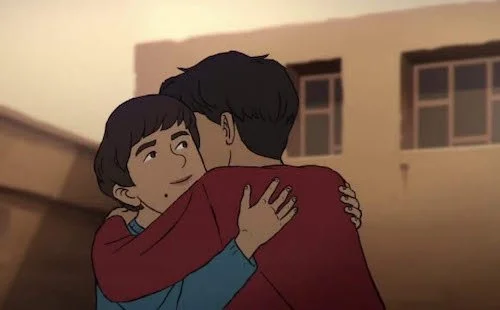Flee
Written by Andreas Babiolakis
The point of a documentary is to inform the viewer of something they don’t know (or know well enough): a pressing issue, a way of life, an event, or even a life. In Flee, you kind of get all of the above, and this alone makes it one of the great documentaries of the 2020’s thus far. Jonas Poher Rasmussen’s project is as exhilarating as it is disquieting, and you will have all of these racing emotions and thoughts all crammed into a lean ninety minutes. At the forefront is Amin, who is getting ready to exchange his vows with his husband, opens up to him about an aspect of his life he barely talks about. He discusses his brutal youth, which entails his years as a refugee, having to leave Afghanistan. This aspect of Amin’s life is one that most of us will (thankfully) never experience, and this element of Flee alone is worth the price of admission; this first-hand recount of such a harrowing series of choices to survive will leave you with your jaw on the ground.
However, Flee is also about so much more, especially since Amin is reflecting back on this chapter of his life. Of course, there is so much sadness in his story, especially regarding his separation from his family and loved ones (particularly during his formative years). Yet there is still an acknowledgment of the brief moments of joy that shaped Amin as a young civilian going through these crises: the music he hears (it almost feels like the film’s style, which I will get into shortly, is inspired by the “Take On Me” music video, especially since the song is heard on a Walkman early in the picture), his personal realizations, and more turning points. As much as he is heartbroken by what happened to him, Amin yearns for who he once was, and he can share these memories for the first time in an eternity. This multifaceted heart that Flee gives us makes the emotions hit even harder.
Flee feels like a living diary, and it doesn’t hold back at all.
The next order of business is to bring up Flee’s animated style, especially its purposefully-choppy nature (which feels like a gathering of old thoughts being pooled together and remembered in little blips). Parts of Flee are made up of sketches: skeletal wireframes that represent the foggiest memories where the deepest feelings remain. Then there are the full on illustrations that feel like diary doodles that have come to life. In between these pieces are short inclusions of documentary clips, either found footage or previously recorded materials (I think; the line is blurred really well to unify all of these sequences).. Together, we have a stream of art of all forms, merging together to make a stunning album of nostalgia and dread.
There’s at least one piece of the film that is photographical and in the present, but I don’t want to spoil this tender moment of triumph. It is incredibly cathartic after a film of shocking revelation after shocking revelation. There’s something warm about Amin being able to tell this information to his fiancee, since we know that he is in good hands now; we can only wonder about the unknown, though. Flee can only answer as much as Amin knows, and there is still enough uncertainty surrounding his predicament. I can only hope that the exposure of this film can somehow tie up these loose ends in favour of Amin, who has clearly had one hell of a life. You can’t help but dread the worst, but you never know. After watching Flee, you’ll feel like anything is possible, and this includes positive outcomes as well.
For as much sadness as Flee contains, it also cherishes the joys in Amin’s life.
Even though the majority of Flee is animated, you feel right there with Amin and his fiancee, to the point that you can feel their presences right beside you. These are all visions from his head as we listen to his stories (quite similar to Waltz with Bashir in this way). A confession can’t get any more intimate than this. You don’t just watch Flee: you live it, and you realize just how disturbing civilization has become. You can also spot the ambition within resilience: for as disgusting as humans can be towards one another, there is much to admire within those who persevere against monstrosities. Flee is a celebration amidst the spreading of awareness of the frightening unknown. Get ready to tear up, but also be prepared for the overwhelming drive that Amin possesses throughout Flee: a survivor of the inexplicable.
Andreas Babiolakis has a Masters degree in Film and Photography Preservation and Collections Management from Ryerson University, as well as a Bachelors degree in Cinema Studies from York University. His favourite times of year are the Criterion Collection flash sales and the annual Toronto International Film Festival.








